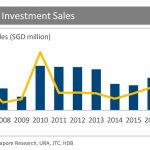Is it wise for SME Bosses to under-declare their incomes?
Many Small and medium enterprise SME business owners are really struggling, many have suffered reduced incomes. Of course this is the general reality.
However a small section of SME owners are not doing as badly, but they have been taught by their tax accountants to declare tax optimally. There is nothing against Tax accountants, as they are singularly focused on reducing tax. But accountants do not take into account the business weighted average cost of capital for business expansion, so they are very narrowly focused.
Image Credit: Singapore Chinese Chamber of Commerce, Wikimedia Commons.
What is the benefit between Saving Tax Versus Getting Access to Cheaper capital
Status Quo of a mature and Stagnant business
Businesses that are mature and cannot grow much more, would do well to save every single cents. This includes optimising on company tax, SME business owner income tax.
Growth Mode
Businesses that aspire to grow its revenue, expand its business either vertically or laterally will need to decide from a combination of funding the expansion entirely from Equity or from debt or a mix of both. Equity funding is the most expensive as you dilute your ownership of the business. If you go into Debt funding, then you will need to consider the various loan options.
Businesses can consider Working Capital Loan, personal loans or Residential equity term loan from their own homes.
Businesses that shows a healthier financial statement backed by actual strong bank balances will have an easier time and cheaper access to capital, in the form of a loan or others.
Similarly SME bosses that declare adequate and reasonable income that commensurate with their experience and scale of operation will be able to get access to Residential Equity Term Loan from their homes.
Accountants are good at a maintaining a business, but many are extremely bad at growing one.
Ask your accountant to read more about the different loan options in Singapore and get them to assess the cost and eligibility of each one.
Where can SME owners find their funding?
Many SME owners suffer losses in their business during the bad times, this means that banks may not want to lend to their companies. Banks generally want to see a profit in the last 6 months or 12 months of their management accounts. This profit must also be backed up by cash as well as cash flow in their operating bank account. Banks also want to look at the monthly average cash balance in your operating bank account.
Many companies are profitable on paper, but SME owner’s company operating bank account have very little balance.
How is this possible?
This is likely because many SMEs face problems of aging accounts receivables (AR). Many SMEs have to extend credit terms to win deals. Many Accounts Receivables (AR) may eventually become bad debts as they struggle to recover the payments, erasing the profits on the books or going into loss. If the SME has more than S$1 million in revenues, they may qualify and want to consider trade credit insurance to insure against defaults from the company buying their goods and services.
Never Borrow when you need money – Borrow before you need the money
When you really need to borrow to tide over a rough patch, you will not be able to borrow due to the situation your company is in. Remember, banks access you or your company at the point of application.
Therefore you should really borrow when you do not need the money. That is when your sales are good, when you have money and are profitable.
However it is too late to talk about this if you are already in this predicament of needing money. You can still explore the various loans out there. Including personal loans, SME bridging loan, secured bridging loan backed by your own personal property. You should always have a SME Micro loan facility even if you do not need it yet.
A SME owner can only rely on himself/herself, in which case, they can use their own residential property for residential equity term loan.
Residential Equity Term Loan is the cheapest form of financing wherever you go, however it is subject to Total Debt Servicing Ratio (TDSR) of the individual.
Refinancing a $500,000 loan by a Self Employed person, Age 35.
Required Monthly Salary = $5,347.77
Income Tax Yearly = $2,240.00
Refinancing a $500,000 loan by a Self Employed person + $154,000 Equity Term Loan, Age 35.
Required Monthly Salary = $7,000.00
Income Tax Yearly = $3,810.00
Additional income Tax = $1,570
Businessman borrowing $150,000 of Working Capital Loan @ 10%
- $150,000 @ 10% interest cost = $15,000
- $150,000 @ 2% (Residential Home Loan interest) = $ 3,000
Difference in Interest costs = $12,000
Less Additional income tax = $ 1,570
Savings in Borrowing Cost is = $10,430
Many times the SME business owner needs these funds for expansion, other times, they simply have to dip into these funds as they may run losses due to delayed payments from their customers. The ability to borrow at 10% per annum is considered lucky and even so, the savings is huge.
Many sudden short term lump sum needs that crops up may need SME bridging loans that cost 3 to 6% per month with admin fees ranging from 2 to 5%.
Find me a SME owner that does not need borrowings or fundings, I will find you 9 that does.
If you agree that Residential Equity Term Loans are cheaper than working capital loans, then why are SME bosses still under declaring their income tax?







